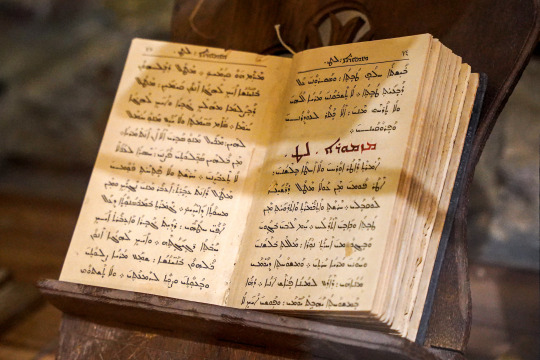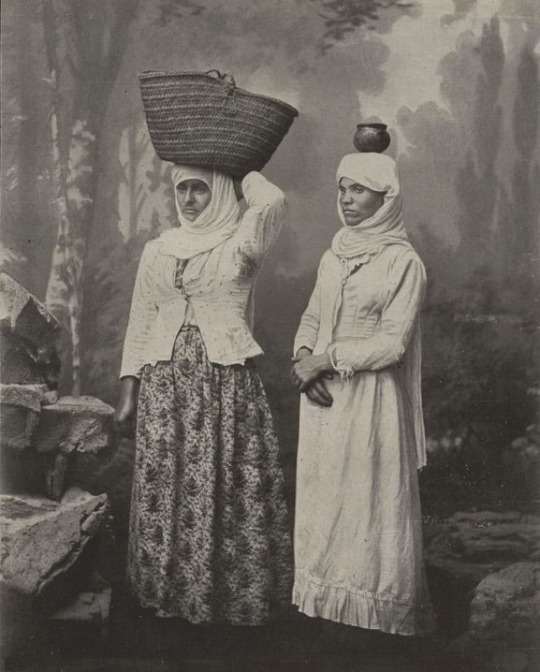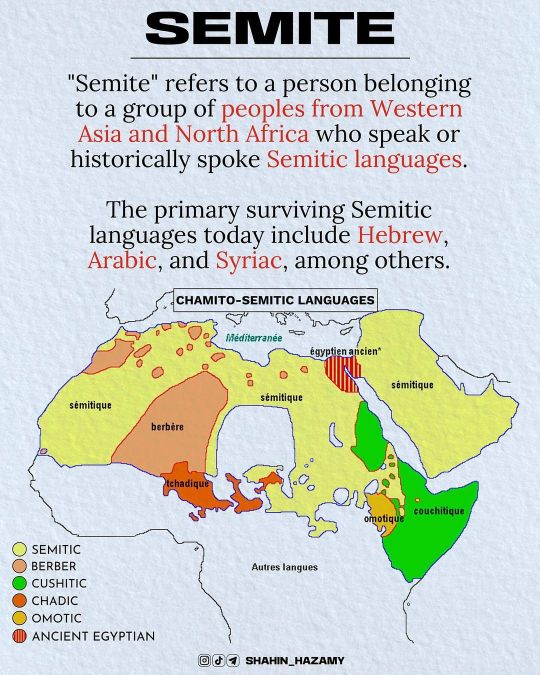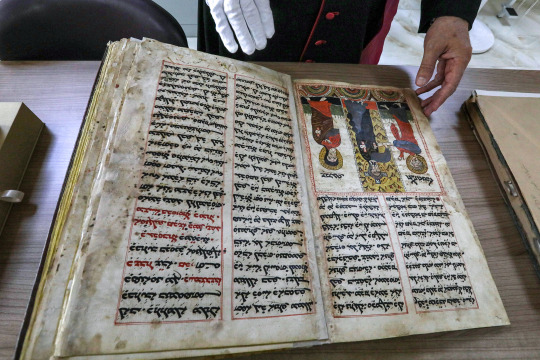#syriac
Text
"Dead are my people, gone are my people, but I exist yet, lamenting them in my solitude. Dead are my friends, and in their death my life is naught but great disaster. The knolls of my country are submerged
by tears and blood, for my people and my beloved are gone, and I am here living as I did when my people and my beloved were enjoying life and the bounty of life, and when the hills of my country were blessed and engulfed by the light of the sun.
My people died from hunger, and he who did not perish from starvation was butchered with the sword; and I am here in this distant land, roaming amongst a joyful people who sleep upon soft beds, and smile at the days while the days smile upon them.
My people died a painful and shameful death, and here am I living in plenty and in peace. This is deep tragedy ever enacted upon the stage of my heart; few would care to witness this drama, for my people are as birds with broken wings, left behind the flock.
If I were hungry and living amid my famished people, and persecuted among my oppressed countrymen, the burden of the black days would be lighter upon my restless dreams, and the obscurity of the night would be less dark before my hollow eyes and my crying heart and my wounded soul. For he who shares with his people their sorrow and agony will feel a supreme comfort created only by suffering in sacrifice. And he will be at peace with himself when he dies innocent with his fellow innocents.
But I am not living with my hungry and persecuted people who are walking in the procession of death toward martyrdom. I am here beyond the broad seas living in the shadow of tranquillity, and in the sunshine of peace. I am afar from the pitiful arena and the distressed, and cannot be proud of ought, not even of my own tears. What can an exiled son do for his starving people, and of what value unto them is the lamentation of an absent poet?
Were I an ear of corn grown in the earth of my country, the hungry child would pluck me and remove with my kernels the hand of Death form his soul. Were I a ripe fruit in the gardens of my country, the starving women would gather me and sustain life. Were I a bird flying the sky of my country, my hungry brother would hunt me and remove with the flesh of my body the shadow of the grave from his body. But, alas! I am not an ear of corn grown in the plains of Syria, nor a ripe
fruit in the valleys of Lebanon; this is my disaster, and this is my mute calamity which brings humiliation before my soul and before the phantoms of the night. This is the painful tragedy which tightens my tongue and pinions my arms and arrests me usurped of power and of will and of action. This is the curse burned upon my forehead before
God and man.
And oftentimes they say unto me, the disaster of your country is but naught to calamity of the world, and the tears and blood shed by your people are as nothing to the rivers of blood and tears pouring each
day and night in the valleys and plains of the earth.
Yes, but the death of my people is a silent accusation; it is a crime conceived by the heads of the unseen serpents. It is a sceneless tragedy. And if my people had attacked the despots and oppressors
and died rebels, I would have said, 'Dying for freedom is nobler than living in the shadow of weak submission, for he who embraces death with the sword of Truth in his hand will eternalize with the Eternity of Truth, for Life is weaker than Death and Death is weaker than Truth.' If my nation had partaken in the war of all nations and had died in the field of battle, I would say that the raging tempest had broken with its might the green branches; and strong death under the canopy of the tempest is nobler than slow perishment in the arms of senility. But
there was no rescue from the closing jaws. My people dropped and wept with the crying angels.
If an earthquake had torn my country asunder and the earth had engulfed my people into its bosom, I would have said, 'A great and mysterious law has been moved by the will of divine force, and it would be pure madness if we frail mortals endeavoured to probe its deep secrets.' But my people did not die as rebels; they were not killed in the field of battle; nor did the earthquake shatter my country and subdue them. Death was their only rescuer, and starvation their only spoils.
My people died on the cross. They died while their hands stretched toward the East and West, while the remnants of their eyes stared at the blackness of the firmament. They died silently, for humanity had closed its ears to their cry. They died because they did not befriend their enemy. They died because they loved their neighbours. They died because they placed trust in all humanity. They died because they did not oppress the oppressors. They died because they were
the crushed flowers, and not the crushing feet. They died because they were peace makers. They perished from hunger in a land rich with milk and honey. They died because monsters of hell arose and destroyed all that their fields grew, and devoured the last provisions in their bins. They died because the vipers and sons of vipers spat out poison into the space where the Holy Cedars and the roses and the jasmine breathe their fragrance.
My people and your people, my Syrian Brothers, are dead. What can be done for those who are dying? Our lamentations will not satisfy their hunger, and our tears will not quench their thirst; what can we do to save them between the iron paws of hunger? My brother, the kindness which compels you to give a part of your life to any human who is in the shadow of losing his life is the only virtue which makes you worthy of the light of day and the peace of the night. Remember,
my brother, that the coin which you drop into the withered hand stretching toward you is the only golden chain that binds your rich
heart to the loving heart of God."
Gibran Khalil Gibran, "Dead Are My People," written during the Great Famine of Mount Lebanon, in which 200,000 people were starved to death by a blockade imposed by European forces to weaken their Ottoman opponents in World War I. The man-made famine killed one in three people in Beirut and the surrounding Mount Lebanon Mutasarrifate (which encompassed today's North, Keserwan-Jbeil, and Mount Lebanon governorates). This peasant population was strangled by threefold oppression: from the European imperialist war machine, Ottoman Turkish imperial oversight, and the local capitalist class. The boom and bust of the global silk industry, monopolized by France, destroyed Mount Lebanon's silk-centered economy shortly before the war, leaving the population impoverished and vulnerable. The famine was key to the European victory which led to the occupation and partition of the Levant and enabled the colonization of Palestine. The partition placed Lebanon under French control, fulfilling a longstanding French colonial desire for Lebanese land and labor.
Further reading/listening:
Graham Auman Pitts, "Was Capitalism the Crisis? Mount Lebanon's World War I Famine" and "A Hungry Population Stops Thinking About Resistance: Class, Famine, and Lebanon's World War I Legacy"
Kais Firro, "Silk and Agrarian Changes in Lebanon, 1860-1914"
Melanie Tanielian, "The War of Famine: Everyday Life in Wartime Beirut and Mount Lebanon (1914-1918)" and The Charity of War: Famine, Humanitarian Aid, and World War I in the Middle East
The Fire These Times, Lina Mounzer and Timour Azhari, Legacy of the Great Lebanon Famine (audio)
87 notes
·
View notes
Text
When British aristocrat Robert Curzon visited an ancient Egyptian monastery, he had no idea what he’d find. Gospel fragments that questioned the Bible’s very authenticity.
81 notes
·
View notes
Text

Ascetical treatises : manuscript, 2108 [1796 or 1797] Date from colophon, which gives the copyist's name as Denḥa the Mountaineer, a priest and monk, and the place of writing the monastery of Zaʻfaran.
MS Syriac 48
Houghton Library, Harvard University
106 notes
·
View notes
Text

June 2023: A Syriac language Bible on display at the Syriac Museum in Qaraqosh. [Waleed Al-Khalid/AFP]
139 notes
·
View notes
Text
Imagine being scared of a language.
Pathetic.
This happens all the time where I live regarding loyalists and the Irish language.
They’re TERRIFIED of the indigenous language of the country, they’ve convinced themselves that they’re indigenous and that the Irish language is apparently a satanic invention.
Neither of those are true but they’ll believe it anyway.
They’re so fragile that it’s comical.
Ashamed of nothing. Offended by everything.
I’ve seen it before in many other countries and with many other languages.
Basque, Armenian, Syriac, Adyghe, Kabardian, Hawaiian, Kurdish, etc.
It’s a language!
It’s harmless!
#dougie rambles#personal stuff#vent post#language#languages#language revitalization#language revival#syriac#syriac language#irish language#gaelige#political crap#ireland#fuck loyalism#brainrot in action#fragility
76 notes
·
View notes
Text
The Syriac language is a dialect of Aramaic that originated in ancient Mesopotamia and has historically been used by various Christian communities, particularly those in the Middle East, such as Syriac Orthodox, Assyrian Church of the East, and Chaldean Catholic Church. It has its own unique script and literary tradition, and it has been used as a liturgical language in some Christian denominations.
Syriac is a later development of Aramaic.
Aramaic, The language spoken by Jesus Christ.
A Semitic language closely related to Syriac.
📍Our Lady of Lebanon, Lebanon.
#christian#jesus#christian blog#christianity#jesus christ#god#bible#bible verse#love#faith#aramaic#syriac#syriac language#aramean
29 notes
·
View notes
Text

Assyrian women of the Syriac Quarter of Bethlehem, Palestine. Studio photograph taken in 1905.
The modern Assyrian community in Palestine was founded by religious pilgrims, but later became mostly comprised of refugees of the Assyrian genocide (also known as the Seyfo).
#my post#palestine#bethlehem#بيت لحم#دولة فلسطين#assyrian#assyria#syriac#vintage photography#tw genocide#oriental orthodoxy#orthodox christianity#middle east#christianity
28 notes
·
View notes
Text
Overcoming Distracting Thoughts In Meditation

In Sant Mat spirituality, meditation is successfully practiced when we keep the proper meditation posture, leave behind all our burdens, thoughts, worries, and worldly distractions behind, and focus all of our undivided attention on going within by way of the third eye center so that we may reach that Sacred Secret Place of the Most High where Divine Grace is flowing. Rising to THE PLACE WHERE GRACE IS FLOWING is a great way of describing the benefit of Surat Shabd Yoga - Inner Light and Sound Meditation - as being a kind of inner baptism or letting the waters of Divine Grace flow over the soul. (There is Light and Sound Within You.)
Overcoming Distracting Thoughts In Meditation - Spiritual Awakening Radio Podcast - Listen or Download MP3 @
https://traffic.libsyn.com/spiritualawakeningradio/Overcoming_Distracting_Thoughts_In_Meditation.mp3
@ the Podcast Website With Buttons That Go To the Popular Podcast APPS - Wherever You Follow Podcasts:
https://SpiritualAwakeningRadio.libsyn.com/overcoming-distracting-thoughts-in-meditation
@ Apple Podcasts:
https://podcasts.apple.com/us/podcast/overcoming-distracting-thoughts-in-meditation/id1477577384?i=1000649158692
Collection of Spiritual Awakening Radio Podcasts @ Apple:
https://podcasts.apple.com/us/podcast/spiritual-awakening-radio/id1477577384
@ Spotify Podcasts:
https://open.spotify.com/episode/7Kgm1r8NxXjXSxhpJifOmP
@ Amazon Music and Podcasts:
https://music.amazon.com/podcasts/ca7918b0-4005-4724-a2e5-b27f51ecdba6/spiritual-awakening-radio
& @ Wherever You Subscribe and Follow Podcasts - At Your Favorite Podcast APP Just Do a Search for "Spiritual Awakening Radio" - (Apple Podcasts, Spotify, Google Podcasts, Amazon, Audible, PodBean, Podcast APP, Overcast, Jio Saavan, iHeart Radio, CastBox, etc...):
https://linktr.ee/SpiritualAwakeningRadio
In Divine Love (Bhakti), Light, and Sound, At the Feet of the Masters, Radhasoami,
James Bean
Spiritual Awakening Radio Podcasts
Sant Mat Satsang Podcasts
Sant Mat Radhasoami
A Satsang Without Walls
Spiritual Awakening Radio Website:
https://www.SpiritualAwakeningRadio.com

#podcast#spiritual awakening radio#james bean#satsang#spirituality#india#meditation#christian mystics#christian mysticism#syriac#gnosticism#gnosis#sant mat#radhasoami#God#soul travel#inner light#inner music#spiritual practice#spiritual podcast
15 notes
·
View notes
Photo


Achilles and Patroclus (ܐܟܠܘܣ ܘܦܛܪܩܠܣ, scene from the Iliad, book 9), and Orpheus taming wild animals, two mosaics from 2nd century Edessa, kingdom of Osroene (ܡܠܟܘܬܐ ܕܒܝܬ ܐܘܪܗܝ), modern day Turkey, with inscriptions in Syriac Aramaic.
204 notes
·
View notes
Text

The Syriac Icon of the Mother of God from Ghighiu Monastery
The Ghighiu Convent is located in the village of Barcăneşti, Prahova County, 44 miles north of Bucharest. The Syriac Icon of the Mother of God arrived to Romania in 1958, brought to Patriarch Justinian by Bishop Vasilios Samaha of Sergiopolis of the Patriarchate of Antioch following a dream in which the Theotokos instructed him to bring the icon, painted on sandalwood in the Syrian school in the 16th century. He presented the icon to the patriarch at Ghighiu Monastery.
Since 1958, many believers have testified that they received quick help, healing, and strengthening of faith after praying to the Mother of God before her holy Syriac Icon.
#romania#eastern europe#eastern orthodox#orthodox church#churches of romania#orthodox christianity#orthodox icon#syriac#icon#mother of god#christianity#faith#romania churches#monasteries#healing#miracles#help#art#16th century
47 notes
·
View notes
Text

Khalil Gibran, Pain (illustration for The Prophet), 1923
51 notes
·
View notes
Text

Jews are not the only Semites.
Although the term "anti-Semite" has been used since the 19th century to describe hatred towards people of the Jewish faith, it is not etymologically appropriate, as Semites also encompasses other groups.
The word "anti-Semitism" appeared in March 1879 in a pamphlet by author Wilhelm Marr, suggested as a replacement for "Judenhaß" meaning hatred of Jews.
The use of the term "anti-Judaism" would prove more appropriate to describe manifestations of discrimination against individuals of the Jewish faith.
Map source: Jacques Leclerc - 2012
#semite#semitic languages#linguistics#antisemitism#jewish#arabic#hebrew#syriac#western asia#north africa#words#knowledge#today i learned#history#antizionism is not antisemitism#free palestine#free gaza#free west bank#palestine#stop the genocide#crime against humanity#palestine will be free#palestinian lives matter#anti zionisim#jews against israel#jewsforpalestine#jews for palestine#jews against genocide#jews
9 notes
·
View notes
Text

Ancient mosaic from Edessa (from the 2nd century CE) with inscriptions in early Edessan Aramaic (Old Syriac).
161 notes
·
View notes
Text

June 2023: Archbishop Michaeel Najeeb looks through an old Christian codex in Syriac. [Safin Hamid/AFP]
78 notes
·
View notes
Text
No language is useless.
Berate and scorn any moron who says otherwise. Harshly!
*yes this is about the Irish language, which many loyalists, unionist politicians and useful IDIOTS in the Republic of Ireland (all because they’re bitter about having to learn it at school, in their 40s! I say move on! For fuck’s sake!) want to see DESTROYED!*
*among MANY other languages*
#dougie rambles#personal stuff#languages#language revival#language revitalization#revitalization#vent post#political crap#language#irish language#gaelige#ireland#indigenous languages#syriac#Adyghe#basque#Talysh#navajo#Chuvash#breton#breizh#hawaiian#mixtec#nahuatl#rapa nui#coptic#Ainu#te reo māori
64 notes
·
View notes
Text
Marks the New Testament as a historical document worthy of careful consideration
More than 5,000 individual Greek manuscripts that contain all or part of the New Testament exist… augmented by more than 8,000 copies of the Vulgate… Further attestation comes in the form of several thousand early New Testament manuscripts translated into Eastern languages such as Syriac, Coptic, Armenian, Slavic, and Ethiopic… Also, the entire New Testament text could be reproduced from specific scriptural citations within the written (and preserved) sermons, commentaries, and various other works of the early church Fathers. This powerful manuscript evidence does not intend to prove that the New Testament is factual, accurate and trustworthy in its account of Jesus’ life, but it does mark the New Testament as a historical document worthy of careful consideration. ~ Samples, Kenneth Richard. ‘Without a Doubt: Answering the 20 Toughest Faith Questions.; p. 92, 93
6 notes
·
View notes